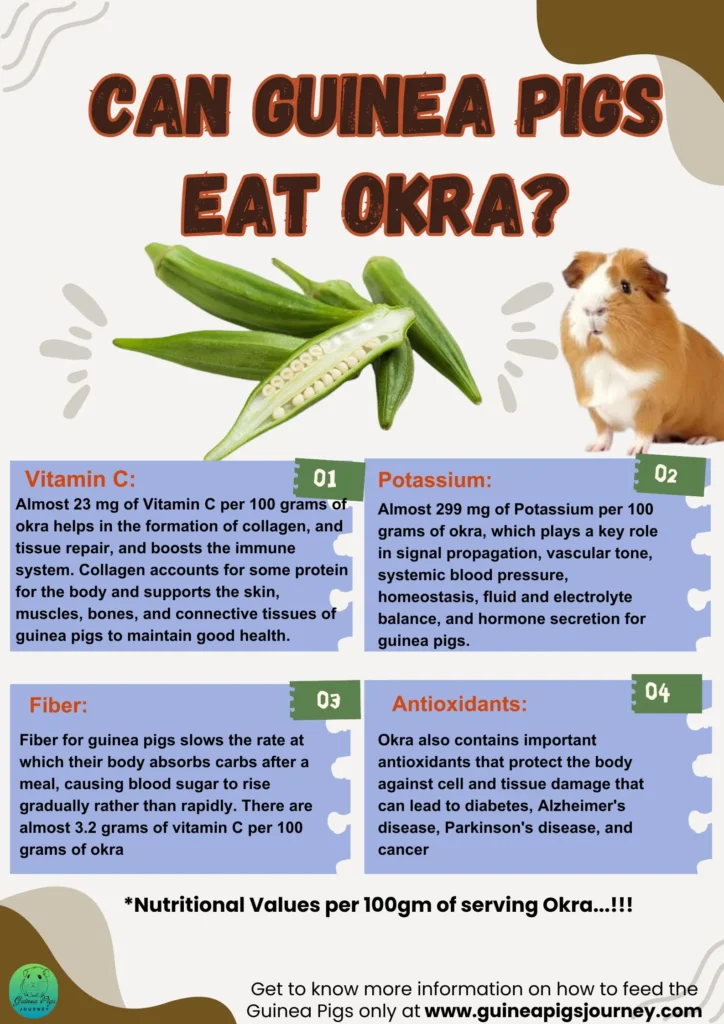Okra also known as lady’s finger in some parts of the world, is biologically classified as a fruit, okra is generally utilized as a vegetable in cooking and is packed with some important nutrients like magnesium, folate, fiber, antioxidants, and vitamins C, K1 and A. It may help support healthy pregnancy, heart health, and blood sugar. With such benefits and important nutrients, a question arises: Can guinea pigs eat Okra? And if they can eat okra, do they like it? And how often can guinea pigs eat okra? Let’s know and understand these questions and more about okra for guinea pigs.
The simple answer is yes, guinea pigs can eat okra in moderation just like other fruits and vegetables. It is low in calories, high in fiber, and a good source of vitamins A and C and minerals like potassium, calcium, and magnesium. Okra for guinea pigs provides several health benefits such as improved blood sugar management, weight loss, and digestion.
However, there are a few drawbacks to feeding okra for guinea pigs which you must know before deciding to offer this green vegetable in guinea pigs diet. This long guinea pig journey has always taught me to research any new food including okra for guinea pigs to avoid any health complications in my little furry friends. So, let’s know about all these nutritional benefits, risks, considerations, and other factors of okra for guinea pigs. So let’s ride on a guinea pig journey to make a responsible decision in feeding your guinea pigs.

Nutritional Requirements of Guinea Pigs:
Due to the delicate and sensitive digestive system of guinea pigs, they require a proper diet plan to fulfill their nutritional requirements because not all foods your guinea pigs eat are safe, like jalapenos peppers, pickles, cheerios, olives, meat, etc.; some are toxic and harmful to their health and digestive system. So, you must also know about those foods not recommended to feed guinea pigs for their safe and healthy life.
The list of safe food including okra for guinea pigs that can be fed is so long that needs great care to know the best way of feeding guinea pigs. In general, Guinea pigs require good and fresh quality hay which makes up 80-90 % of most of their diet along with 10 % of fresh and good quality fruits and vegetables such as sugar snap peas, broccoli, Swiss chard, asparagus, arugula, dandelions, dill, basil, rosemary, pears, honeydew melon, pomegranate, cherries, plums, etc. as a treat in moderation.
Guinea pigs can also be served with some amount of only dedicated guinea pig pallets but it should not be part of their main staple and should be served the recommended portion or mentioned on pallets bag for guinea pigs. Guinea pigs should also be served with fresh, clean, chlorine-free drinking water at all times and must be checked and changed twice a day for their good health.
Okra for guinea pigs can be a nutritious addition if served in moderation and watched out for potential drawbacks which we will discuss in subsequent paragraphs. Excessive feeding of anything including okra for guinea pigs can be very harmful causing health-related issues, so before deciding to introduce okra into guinea pigs’ diet let’s explore the nutritional values of okra for guinea pigs to understand the potential risks and benefits okra provides to little furry friends.
Nutritional Analysis of Okra for Guinea Pigs:
According to the USDA food database, it is a good source of minerals, vitamins, antioxidants, and fiber which can reduce your guinea pigs’ chances of developing a range of health conditions, including obesity, diabetes, and cardiovascular disease. Listed below are the nutritional values and percentages per 100 grams of raw Okra for guinea pigs to understand the values and percentages of these important nutrients okra for guinea pigs contain and how much okra is too much for a guinea pig for optimum health benefits.

| Nutrients | Value per 100 grams | Daily Value (DV %) |
| Calories | 33 kcal | |
| Carbohydrates | 7.45 grams | 3 % |
| Water | 89.6 grams | |
| Fat | 0.19 gram | 0 % |
| Protein | 1.93 grams | 4 % |
| Dietary Fiber | 3.2 grams | 11 % |
| Sugar | 1.48 gram | |
| Ash | 0.86 grams | |
| Net Carbs | 4.25 grams | |
| Vitamin C, total ascorbic acid | 23 mg | 26 % |
| Vitamin A, RAE | 36 µg | 4 % |
| Vitamin K | 31.3 µg | 36 % |
| Vitamin B6 | 0.215 mg | 13 % |
| Vitamin D | 0 mcg | 0 % |
| Cholesterol | 0.00 mg | 0 % |
| Fatty Acid | 0.026 g | 0 % |
| Calcium, Ca | 82 mg | 6 % |
| Phosphorus, P | 61 mg | 5 % |
| Potassium, K | 299 mg | 6 % |
| Iron, Fe | 0.62 mg | 3 % |
| Magnesium, Mg | 57 mg | 14 % |
| Zinc, Zn | 0.58 mg | 5 % |
| Sodium, Na | 7 mg | 0 % |
| Copper, Cu | 0.109 mg | 12 % |
| Folate | 60 µg | 15 % |
| Beta-carotene | 416 µg | |
| Lutein + Zeaxanthin | 280 µg |
Note: * The % Daily Value (DV) indicates how much a nutrient in a serving of food subsidizes a daily diet.
Is Okra Safe For Guinea Pigs?
Yes, Okra is safe to feed your guinea pigs in moderation, is low in calories, is high in fiber, and is a good source of vitamins K and C. Unfortunately, okra for guinea pigs is also high in calcium and oxalate which is a serious concern while introducing the quantity of okra for guinea pigs. If our guinea pigs consume too much calcium and oxalate, it can contribute to the formation of kidney and bladder stones which would be very painful for our guinea pigs causing urinary tract issues and bleeding in their pee. So, it is very important to offer this vegetable occasionally as a treat in small quantities to avoid any kind of hazardous situation.

It is always recommended to monitor or watch for any kind of allergic signs before introducing okra into your guinea pig diet. Do not hesitate to give a call to your veterinarian for a review and medical checkup of each guinea pig to maintain a healthy life, especially if they have had problems in the past.
What Are the Nutritional Benefits of Okra For Guinea Pigs?
Okra for guinea pigs is low in calories but packed full of nutrients. These nutrients in okra for guinea pigs may make it useful for preventing several health problems. Let’s know what type of nutrients and their benefits okra contains for guinea pigs.

Vitamin C:
Okra for guinea pigs contains 23 mg of vitamin C per 100 grams serving of okra which contributes to their overall immune function. Just like humans, guinea pigs cannot produce their vitamin C and require an external source like rosemary which is also a good source of vitamin C for guinea pigs. It also helps with growth, development, and repair of organ tissues.
Vitamin K:
For bone health, Okra is packed with an essential nutrient vitamin K. Vitamin K helps build stronger bones by supporting bone-building cells called osteoblasts. This vitamin also activates certain proteins that are required for blood coagulation, increases bone mineral density, and is linked to a reduced risk of fractures for guinea pigs. Okra for guinea pigs contains 31.3 µgof vitamin K per 100-gram serving of okra.
Antioxidants:
Okra is a good antioxidants that help support the immune health of guinea pigs and important to note that okra does not contain sugar which is good news but moderation is the key to serving. The antioxidants in okra, including vitamins A and C, help combat free radicals, improve skin texture, and promote a healthy complexion.
Dietary Fiber:
Okra for guinea pigs is high in fiber, aiding digestion and preventing constipation. It also supports a healthy gut by promoting the growth of beneficial bacteria. The fiber content in okra helps reduce cholesterol absorption, lowering the risk of heart disease and improving overall cardiovascular health. There is 3.2 g in a 100 g portion of okra.
What Are The Risks Of Okra For Guinea Pigs?
Feeding too much okra to your guinea pig can adversely affect them in many ways, some of the risk factors of okra for guinea pigs include:

Risk of Bladder Stones:
The high amount of calcium found in okra for guinea pigs may contribute to the formation of bladder stones due to excessive consumption of calcium content. Although calcium is necessary for guinea pigs’ bone and teeth health, excessive calcium can also be bad for them. So it requires great care to feed food high in calcium to avoid any hazard or formation of bladder stones which can be very painful for your furry friends.
Risk of Kidney Stones:
The presence of oxalate in okra for guinea pigs can lead to the formation of kidney stones which are very painful for them causing pain and bleeding in their urinary tract. High oxalate foods, such as okra and spinach, may increase the risk of kidney stones in guinea pigs.
Gastrointestinal problems:
Okra contains fructans, which is a type of carbohydrate. Fructans can cause diarrhea, gas, cramping, and bloating in guinea pigs with existing bowel problems. So, it is always suggested to start with a small amount if it is their first time or new food for your guinea pigs and introduce it gradually and in moderation to avoid any kind of complication or risk factor.
Allergic Reaction:
It is very crucial to watch out for any possible allergic reaction to okra for guinea pigs which can cause serious complications for your furry friends. It is very important for guinea parents to consult a vet before introducing any new food including okra to the guinea pigs’ diet and always monitor the reaction or any change in guinea pig’s behavior if you introduce any new food to the guinea diet, then immediately contact your veterinarian for further guidance.
How Often Can Guinea Pigs Eat Okra? (Frequency and Size of Serving Okra)
Due to the sensitive digestive system and unique nutritional requirements of guinea pigs, you have to make a responsible and caring decision when deciding to introduce the quantity of okra in their diet to get potential benefits and avoid risk factors.
The recommended aim to serve okra for guinea pigs should be no more than 1-2 times per week as an occasional treat while keeping in mind the moderation process. The key is to provide a balanced nutritional profile and avoid digestive upset and other serious health problems as explained above.

How Much Okra Can Guinea Pigs Eat?
It is always suggested to start with a small portion to watch for any dislike by guinea pigs or any possible allergic reactions.
The recommended portion and size of serving can be achieved through understanding a rule of thumb i.e. do not serve more than 100 grams of okra at a time per serving in a day that is almost 2-3 average size okra. The average length of one piece of okra is anywhere between four inches to six inches.
As a varied diet and adding a nutritional boost to the guinea pig diet, you may also mix okra with compatible veggies like cucumber, Zucchini, Romaine lettuce, Bell peppers, Parsley, Butternut squash, Mustard greens, Mushrooms, etc. that guinea would love to enjoy as a treat but with moderation.
Can Guinea Pigs Eat Okra Every Day?
No, just like any other fruit or vegetable, okra is not considered to be the main staple or everyday food for guinea pigs due to the high amount of oxalate and calcium content that can lead to the formation of kidney and bladder stones. So it is suggested to avoid daily feeding of okra to guinea pigs and serve them as an occasional treat and recommended frequency and portion so that they can get maximum nutritional benefits and avoid risk factors.
What Part Of Okra Can Guinea Pigs Eat?
After understanding the quantity and portion of serving okra to guinea pigs, now it is also important to know which part of okra vegetable or plant is safe to feed your guinea pigs.

Can Guinea Pigs Eat Okra Plant Leaves?
Due to the hard and coarse texture of okra plant leaves, it is not recommended to feed okra plant leaves to your guinea pigs as it can hurt their gums or throat while chewing and swallowing. Okra leaves have also been reported to cause allergic reactions in some studies.
Can Guinea Pigs Eat Okra Stems?
Okra has short woody stems and these are somehow hard to chew on for guinea pigs which they dislike while eating okra stems. So, it is suggested that do not offer okra stems to your guinea pigs, rather remove or cut them off from the okra while offering your guinea pigs.
Can Guinea Pigs Eat Okra Flowers or Blossom?
Yes, Okra blossoms or flowers are safe for guinea pigs to feed. However, they should be offered gradually and in moderation as part of a varied diet to avoid any health-related issues.
Can Guinea Pigs Eat Okra Seeds or Pods?
Yes, okra seeds or pods are safe to feed your guinea pigs as they are not so hard for them to chew and swallow. Okra seeds or pods offer many health benefits to your guinea pigs.
Can Baby Guinea Pigs Eat Okra?
Yes, baby guinea pigs can eat okra in very small quantities and occasionally as a treat in moderation. Always serve them in small pieces by cutting them so that they can swallow them easily. As we know, young and baby guinea pigs need calcium more than adult ones, so okra can be beneficial for baby guinea pigs in small quantities.
It is best to start with a small portion i.e. a single average-size okra for baby guinea pigs reaching the age of 4-6 weeks and increase the portion by monitoring the adjusted strength of baby guinea pigs and offering another little bit after a day or two. Always monitor and observe their reaction after introducing any new food and consult a veterinarian for the best guidance.
Can Guinea Pigs Eat Okra Pickles?
No, guinea pigs cannot eat anything pickled including pickled okra as pickled okra are often high in sodium and contain vinegar, spices, acid, and salt which can be unhealthy and harmful to guinea pig’s health. Pickled okra high in salt and acid can cause serious digestive issues including bloating, stomach ache or upset, high blood pressure, diarrhea, vomiting, acid reflux, kidney pain, etc.

Can Guinea Pigs Eat Canned Okra?
Due to the sensitive digestive system of guinea pigs, canned food and canned okra are not recommended to feed your guinea pigs as they contain added salt, sugar, preservatives, syrups, chemicals, etc. which can cause digestive upset for guinea pigs causing indigestion, bloating, diarrhea, vomiting, etc. It is always suggested to offer fresh, raw, and organically produced okra for guinea pigs to keep them healthy and fit for a longer time.
Can Guinea Pigs Eat Frozen Okra?
Yes, frozen okra can be fed to your guinea pigs in moderation but after making them thawed and normalizing their temperature to room temperature. It is advised to avoid serving cold and frozen food including frozen okra as it can cause serious digestive upset and lead to diarrhea, bloating, and stomach upset.
Alternatives to Okra for Guinea Pigs:
Although guinea pigs love to eat okra. However, some individual cases may have allergic reactions or dislike okra in their diet. Guinea parents need to know about alternative food for their furry friends. It is always advised to conduct proper and thorough research before introducing any new food or alternatives and consult the veterinarian for best guidance.

| Cabbage | Tomato | Green beans, raw |
| Collard greens | Celery | Blackberries |
| Bok Choy | Cherries | Sweet Potato |
| Dragon Fruit | Beetroots | Artichoke |
| Brussel sprouts | Carrot | Jicama |
| Kale, raw | Bell pepper | Cilantro |
| Arugula, raw | Wheatgrass | Dill |
| Parsnips | Zucchini | Spinach |
| Dandelion greens, raw | Pomegranate | Turnip greens, raw |
| Beet greens, raw | Nectarines | Grapefruits |
Conclusion: Okra for Guinea Pigs
Overall, It is OK to feed okra in small quantities and in moderation to get potential health benefits from okra for your furry friends, but unfortunately, excessive feeding of okra can cause serious health issues due to the presence of high amounts of calcium and oxalate which can lead to the formation of kidney and bladder stones in your guinea pigs. So, to avoid any health complications or risk factors, it is suggested to feed them about 1-2 times a week with a very small quantity and average size okra at a time.
For most people and guinea pigs, okra, like other vegetables, is a healthful addition to the diet. It’s rich in magnesium, folate, fiber, antioxidants, and vitamins C, K1, and A. As with any food or nutrient, it is best to eat it in moderation and as part of a varied, balanced diet. You can also speak to your vet about your guinea pig’s diet if you’re at all concerned.







